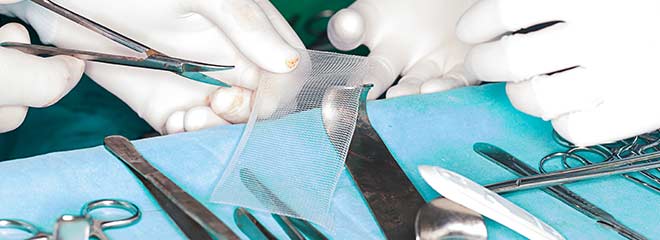
Atrium C-Qur lawsuits are being filed across the country, alleging that the surgical hernia mesh repair implants lead to serious side effects. You may be entitled to compensation for your medical bills, lost income and pain and suffering, among other losses. We are working with experienced Atrium C-Qur Hernia Mesh lawyers around the country who will not charge no fee unless you obtain compensation. For a free (no obligation) case evaluation, call our toll free number 24/7, or fill out a contact form.
Have you suffered any serious side effects or injuries after the use of an Atrium C-Qur Hernia Mesh?
Call the Atrium C-Qur Hernia Mesh lawyers of d’Oliveira & Associates Today!
What Is an Atrium C-Qur Hernia Mesh Implant?
 The C-Qur is a mesh implant manufactured and sold by Atrium Medical that is used in hernia repair surgeries to help strengthen weakened or damaged tissue. Hernias are quite common and occur when an organ, intestine or fatty tissue pushes through an opening or weak spot in the surrounding connective tissue. This most often occurs around the lower abdominal wall area.
The C-Qur is a mesh implant manufactured and sold by Atrium Medical that is used in hernia repair surgeries to help strengthen weakened or damaged tissue. Hernias are quite common and occur when an organ, intestine or fatty tissue pushes through an opening or weak spot in the surrounding connective tissue. This most often occurs around the lower abdominal wall area.
When a hernia requires surgical repair, the thin, flexible implant is inserted through an incision in the abdomen and affixed over the weakened tissue to provide support and prevent further damage to internal structures. A protective layer of lubrication generally covers most mesh implants to promote ease of use and healing. The C-Qur was specifically designed by Atrium to be easy for surgeons to insert and place onto the abdominal wall by using a thin layer of fish oil for this purpose. The C-Qur is indicated for use in hernia repair, chest wall reconstruction, and to reinforce other traumatic or surgical wounds.
Why is the C-Qur Mesh Implant Dangerous?
 Atrium claims that the protective layer of Omega 3 fatty acids applied to the C-Qur promotes healing by preventing inflammation and scar tissue build up. However, studies indicate that there is a higher rate of side effects such as pain and infection associated with the C-Qur than with other mesh products. Many who have been treated with the C-Qur mesh report ongoing chronic pain, serious infections, recurrence of the hernia, and even bowel obstructions requiring additional invasive surgeries to repair.
Atrium claims that the protective layer of Omega 3 fatty acids applied to the C-Qur promotes healing by preventing inflammation and scar tissue build up. However, studies indicate that there is a higher rate of side effects such as pain and infection associated with the C-Qur than with other mesh products. Many who have been treated with the C-Qur mesh report ongoing chronic pain, serious infections, recurrence of the hernia, and even bowel obstructions requiring additional invasive surgeries to repair.
The problem is thought to be in the design of the mesh and its packaging, which uses a thinner than usual layer of lubrication to make the mesh easier to handle during surgery. When exposed to humidity, the mesh can adhere to the inner layer of the packaging and be dangerous to use in surgery. Atrium was also cited by the FDA for failing to meet sanitation standards in its packing process, thus increasing the change of serious infections.
What Are the Common Atrium Mesh Side Effects?
- Chronic pain in lower abdominal area
- Internal and external infections
- Scar tissue causing adhesions
- Blockage of small or large intestine
- Heavy bleeding
- Seroma, fluid buildup at the site
- Organ perforations
- Mesh migration and shrinkage
- Allergic reactions and skin rashes
- Recurrence of hernia requiring surgery
- Failure of mesh and need for removal
- Neurological changes and difficulties
Why Are There Atrium Mesh Lawsuits?

Those who have been injured by the C-Qur mesh allege that Atrium made and marketed a defective medical device, failed to comply with safety standards in designing and making the device, and failed to warn doctors and patients about the likelihood of injury as a result. It is also noted that Atrium ignored multiple sterility complaints, including reports of human hair being found inside some of the mesh implants. After the FDA cited Atrium for these issues in 2012, a Class II Recall of the C-Qur was announced by the FDA in 2013. While Atrium did send a letter to surgeons asking them to inspect the implants, the C-Qur was never pulled from the shelves and continued to be marketed by Atrium.
Patients treated with the mesh continue to come forward with injuries such as heavy bleeding, painful scar tissue, and ongoing chronic pain after placement of the mesh. Many patients have had to have additional surgeries to remove and replace the defective mesh implants.
C-Qur lawsuits brought against Atrium Medical allege:
A number of lawsuits alleging that the materials used in the C-Qur mesh implants are dangerous, the design is defective, and Atrium failed to warn of the dangerous side effects have been filed across the country. Because so many of the lawsuits make the same allegations, a number of these suits have been consolidated in federal court in New Hampshire so that they can proceed through the litigation process together in a time and cost effective manner. While there is currently no class action against Atrium, individual lawsuits continue to be filed alleging that the C-Qur caused serious injury.
Timeline of Atrium Hernia Mesh Events and Lawsuits:

- December 2016: Multidistrict Litigation (MDL) established for 28 pending C-Qur cases in the United States District Court, District of New Hampshire.
- October 2016: After numerous lawsuits were filed against Atrium Medical for injuries alleged to have been cause by the C-Qur, lawyers filed a motion to allow cases to be consolidated.
- June 2016: A week after Ethicon pulled its defective Physiomesh patch from the market, Maquet Medical, a parent company of Atrium, sent a letter out trying to convince surgeons to switch to the C-Qur to “minimize the impact on patients.”
- August 2013: FDA announces Class II recall of C-Qur due to packing defects making the product unsafe for use.
- July 2013: Atrium sends a letter to customers alerting them to certain defects but does not pull the C-Qur off the market.
- October 2012: Atrium cited for numerous manufacturing and quality violations after on-site FDA inspection of plant in New Hampshire.
- March 2006: C-Qur approved for use by FDA after utilizing fast track 501(k) application process.
Have There Been Any Medical Studies Completed on the Atrium C-Qur Mesh?

While Atrium claims that the C-Qur significantly reduces adhesion formation during healing time, a study conducted in March of 2009 indicated that the C-Qur actually contributed to a higher rate of the development of adhesions in the long-term after surgery. In December 2011, a study was conducted by Department of Surgery at the Washington University School of Medicine to evaluate the strength of 14 different types of surgical mesh implants, including the C-Qur. Results showed that the C-Qur was prone to break or move under certain conditions, and that tacking the implant in place did not provide significant reduction in migration. Other studies that have included the C-Qur indicate that the composition of the mesh implant may cause problems with healing and staying in place also. Medical researchers have recommended that more information is needed to determine the C-Qur is safe.
What Has The FDA Done?
 The FDA initially approved the C-Qur hernia mesh in March 2006 via its 501(k) application process. This means that the C-Qur underwent little to no pre-market testing prior to use because there were already similar products on the market. A short time later, issue arose when numerous patients began to report adverse side effects and serious complications with the patches after surgery.
The FDA initially approved the C-Qur hernia mesh in March 2006 via its 501(k) application process. This means that the C-Qur underwent little to no pre-market testing prior to use because there were already similar products on the market. A short time later, issue arose when numerous patients began to report adverse side effects and serious complications with the patches after surgery.
After receiving and reviewing these complaints, the FDA conducted an on-site inspection of the Atrium manufacturing plant in New Hampshire, which revealed disturbing manufacturing and quality violations. Many of the deficiencies found had to do with inadequate sterilization procedures, which could put patients at serious risk for injury. Atrium was ordered to fix the issues promptly in order to bring the facility up to code. The FDA then announced a Class II recall of the C-Qur mesh in 2013, which was initiated due to design defects that may cause the mesh to adhere to the packaging.
Why Contact Us?
 If you or a loved one have suffered serious Atrium C-Qur Hernia Mesh side effects, you may be entitled to compensation for your medical bills, lost income and pain and suffering, among other losses. We are currently working with experienced Atrium C-Qur lawyers across the country, who do not charge a legal fee unless you win an award or settlement. For a free (no obligation) case evaluation, call our toll free number 24/7 at 1-800-992-6878 or fill out a contact form on our website.
If you or a loved one have suffered serious Atrium C-Qur Hernia Mesh side effects, you may be entitled to compensation for your medical bills, lost income and pain and suffering, among other losses. We are currently working with experienced Atrium C-Qur lawyers across the country, who do not charge a legal fee unless you win an award or settlement. For a free (no obligation) case evaluation, call our toll free number 24/7 at 1-800-992-6878 or fill out a contact form on our website.
